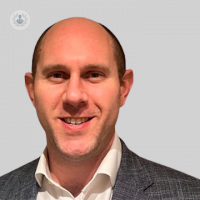The importance of self-awareness in breast cancer
Written in association with:Self-awareness and self-examination are vital tools in the early detection of breast cancer. Being able to monitor your own body for irregularities can mean all the difference to how the cancer is treated if found. In this article, leading oncoplastic breast surgeon Mr Daniel Glassman tells us about the importance of self-awareness, and how it can be utilised against breast cancer.

Breast change is normal. The breasts change monthly, during every menstruation cycle where they will swell and become more tender for a period of time. They also will change in size and appearance during and after pregnancy, and over the years as you age. Change in the breasts is not a reason to panic, as long you are already familiar with your breasts and are aware of their normal characteristics and behaviours.
What is the difference between breast self-awareness and self-examination?
Self-awareness is different from a self-exam because breast self-awareness is about establishing a context and a baseline of what is normal to you. Everyone’s breasts are different and there’s no one correct way for breasts to look or feel. A self-exam is only useful once personal normalcy is established and recognisable, and consists of studying the breasts to take note of any abnormalities or new changes.
You should do an exam at least once a month and a week after menstruating, as that is when the breasts have gone down to their normal size and sensitivity. The more times you repeat the exam, the more familiar you will be with their regular size, texture, and shape, and will become better attuned to noticing anything out of normal. Breast self-examinations become more effective with practice, and patients ideally should make breast self-awareness a habit as soon as they begin developing breasts. However, it is never too late to start.
How to conduct a breast self-exam
First, examine the breasts in the mirror from the front and sides, and with arms both up and down. Take note of any asymmetries between the two breasts. Using the hand opposite to the breast you are examining, sweep across and over all around the breast – up and down, left to right. After you have done both breasts, you can start feeling around more thoroughly for any bumps, ridges, or masses. The breast tissues span from the underarm area to the sternum to the clavicle, and include the nipples, so be sure to include these areas in your examination. Keep in mind to use the pads of the fingers, as they are the most sensitive part of the hand and will be able to pick up on small details, and change the pressure of your fingers throughout each step of the exam to feel the tissue at different depths underneath the surface of the skin. Being methodical with your examination technique is the most efficient way to conduct a complete, in-depth exam.
What are things to note in a breast self-exam?
Abnormalities to keep an eye out for include:
- New lumps
- Nipple discharge or bleeding
- Irregular swelling
- Changes in size or shape
- Swollen lymph nodes in the armpit
- Nipple redness or pain
- Dimples, puckers, bulges, or ridges
- Rashes, sores, itchiness, or scaly skin
If you find any masses, note if they feel bumpy, smooth, “floating” freely, or “rooted” deeply beneath the skin. Any which feel firm or like they’re rooted to the chest wall could be cause for concern.
Why is it important to practice breast self-awareness and do self-exams?
While a mass could be a tumour, it could also be an inflamed breast lobe, a cyst, or a fibroadenoma, which is why it is important to keep note of any other symptoms. Masses that last more than one cycle need to be brought to the attention of the doctor, who might suggest an ultrasound, mammogram or biopsy for further analysis. Being diagnosed with a disease like cancer can be upsetting, but it is important to remember that the earlier that cancer is detected, the sooner it can be treated and the better the chances of managing or curing the disease.
The self-exam isn’t a foolproof way of detecting breast cancer or other diseases, and a lot of the time, the actual diagnosis is far more benign. However, becoming intimately familiar with your body and how it operates will help avoid future anxieties and also facilitate a fast reaction, should you one day notice something is not quite right.
If you are concerned about any abnormalities in your breasts, you can consult with Mr Glassman via his Top Doctors profile


